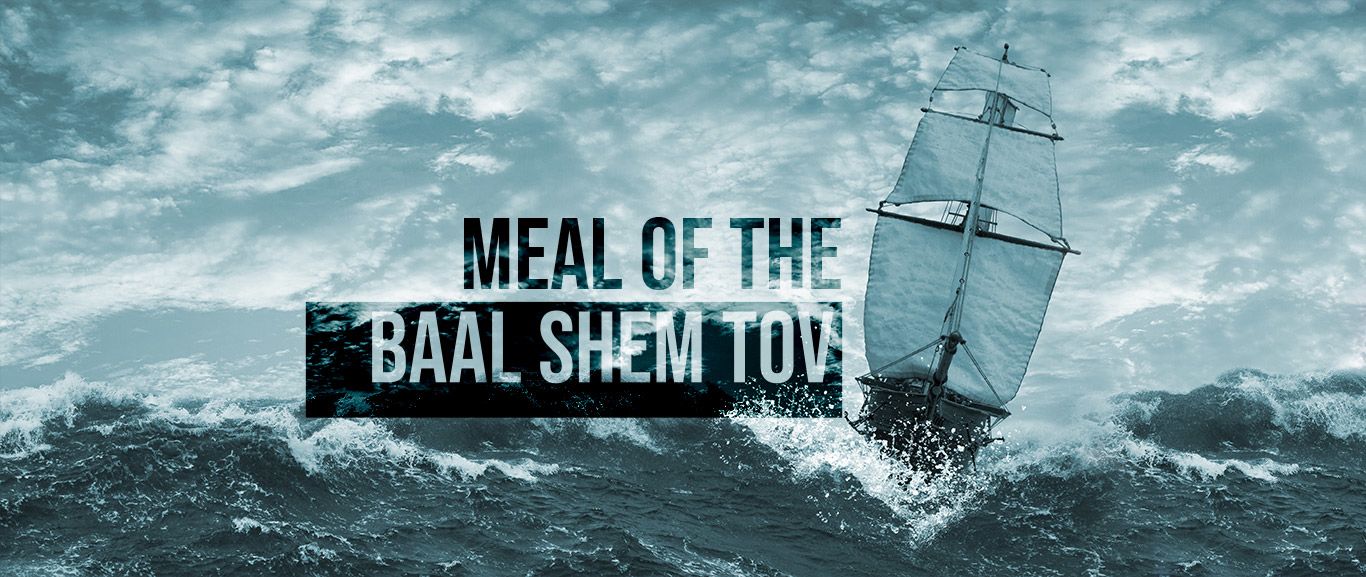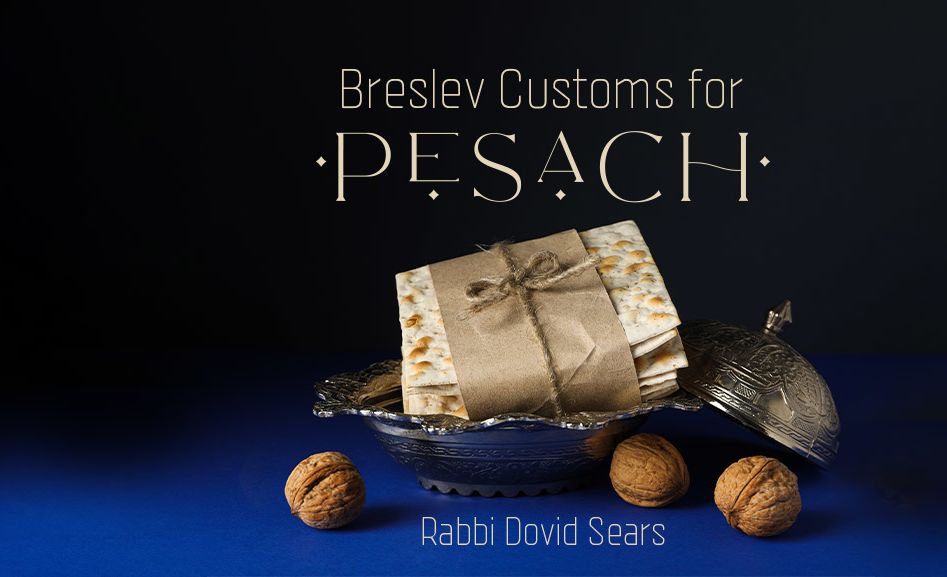
Shevi’i shel Pesach: Meal of the Baal Shem Tov
This story is traditionally told over on the last day of Pesach, at the "Meal of the Baal Shem Tov," which is eaten just before sunset. We eat this meal to commemorate the Baal Shem Tov's miraculous deliverance from the cannibals and his return to Istanbul.

After many years of wanting to go to Eretz Yisrael, the holy Baal Shem Tov finally decided to make the long journey. He hired a wagon and set out from Medzeboz, Ukraine together with his righteous daughter Udell and his student and attendant Reb Hirsch Sofer. They planned to travel to Istanbul by wagon and from there, to travel by ship to the Holy Land.
After several months on the road, the Baal Shem Tov, his daughter Udell, and Reb Hirsch Sofer arrived in Istanbul on the eve of Passover. The holy Baal Shem Tov took almost no money with him, because he had absolute faith that God would provide for all his needs on the journey. He had just enough money to rent the cheapest room in a local inn, but did not have any left over to buy the necessary items to celebrate the Seder that evening. He decided to go to the local study hall, learn Torah, and wait for God to provide him with all his needs.
Udell and Reb Hirsch were also not the least bit concerned, because miracles often occurred to the holy Baal Shem. They expected that God would certainly not abandon him now. Since Udell expected God to provide for their needs, she decided to go to the seashore to launder her father’s clothing for the upcoming holiday.
A very wealthy couple lived in Germany. The doctors had told them that they could never have children. They heard about the Baal Shem Tov and decided to travel to Medzeboz — perhaps he would be able to perform a miracle whereby God would give them a child. When they arrived in Medzeboz, however, they discovered that the Baal Shem Tov had already left for the Holy Land. They decided to follow his trail and try to catch up with him. They also arrived in Istanbul on Passover eve. They registered at an inn and asked many people in Istanbul if they had seen the holy Baal Shem Tov, but no one had seen him.
They decided to go to the docks and ask the sailors if the Baal Shem Tov had boarded one of the ships traveling to Eretz Yisrael. On their way to the docks, they saw a woman doing her laundry and they asked her if she had seen the Baal Shem Tov. That woman was the Baal Shem Tov’s daughter, Udell.
Udell told them that she was the Baal Shem Tov’s daughter and that her holy father was staying at the same inn where they were lodging. When the couple heard that, their joy knew no bounds. They invited Udell, her father, and Reb Hirsch to join them for the Seders.
When the Baal Shem Tov returned from the synagogue after the evening holiday prayers, he was not the least surprised and joined the wealthy couple at their Seder. At the beginning of the Seder, the Baal Shem Tov turned to the couple and said to them, “I know why you have come and your salvation will soon be on its way.” No sooner had he spoken, when his face suddenly changed, and a tortured pained expression replaced his pleasant countenance as he went into a trance.
His daughter, Udell, was concerned. Although she had seen his soul ascend to heaven on many occasions, she had never seen her father’s face so lifeless before. Some time later, however, the Baal Shem Tov returned to normal, and beaming with joy he said. “Heaven was angry for me for violating the laws of nature to make a miracle that would grant children to this couple, they therefore decreed that I should lose my share in the world to come for this act. I answered that now I could serve God for pure motives without expecting any reward and I rejoiced. The Satan saw that I became even happier when they took away my reward in the hereafter, and he then convinced the heavenly court to return my share in the future world.
After the meal, when the Baal Shem Tov came to the words of the Hallel, “Le’otot niflaot — For He performs wonders,” his voice rang out loud and clear, as he articulated the words with utter devotion over and over again. The sound of his words carried out far into the stillness of the night. The rest of the Seder passed and it was early morning by the time they finished. Until now, the merchant had refrained from making any comments or asking questions for fear of disturbing his Godly visitor.
But now that the Seder was over, he ventured several comments. “Rabbi, if I may ask…why did you repeat that particular verse of the Hallel?”
“The Jews of Istanbul were in grave danger,” disclosed the Baal Shem Tov. “While I reciting that verse, my soul ascended to heaven and I interceded on their behalf. I continued with the Hallel when I was informed that the decree had been nullified. You will learn all about it tomorrow morning in shul.”
On the following morning, as the congregation assembled for their holiday prayers, one prominent member of their community suddenly rushed in: “Mazel tov, my good friends. Congratulate yourselves on having escaped imminent danger.”
Everyone crowded around to hear the details of his surprising announcement. “As you may well know,” he began, “our late Sultan was in the habit of dressing in common clothing to walk incognito among his people, as did his father, the previous Sultan. This particular stroll took him far out of the city limits and before he realized what had happened, he was surrounded by a group of roving bandits.
“They seized him and brought to their hideout. It occurred to the Sultan that these thieves did not know his identity.
After his pockets had been emptied of the all his valuables, the Sultan was confident that he would be released. But the thieves informed him that they must kill him since he knew the location of their hideout. The Sultan contemplated his chances of survival. ‘If I reveal my identity, they will surely kill me, for they would realize that capital punishment would await them if anyone knew whom they had captured and robbed. Let me use my wits to see if I can save myself.’
“‘I am trained with a particular skill which may bring you much profit,” the Sultan told his captors. They gathered around the Sultan in interest: “I know how to fashion valuable tapestries. My products will fetch high prices for you on the market. Try and see.”
The robbers were interested in making a profit and willing to give his plan a fair try. They purchased simple mats from which the Sultan fashioned his tapestry. After two days, the first product was ready for the market. The finished product did not over impress the bandits, but the Sultan hastened to warn, “This tapestry can only be appreciated by a true connoisseur of art. Do not be daunted if at first people laugh at the price you ask. But by no means are you to settle for less than what I tell you. Go from shop to shop until you find the proper customer, a person who can appreciate this fine work of art.”
“It happened just as the captive has foretold. The bandits were greeted by jeers and hoots when they demanded an outlandish price for their merchandise. The scene was repeated at every store they entered.
“By now a large crowd of people had gathered to see the outcome of the farce. ‘Who would be mad enough,’ they wondered, ‘to pay the price these men were asking for what appeared to be a simple mat?’ Just then my father happened to walk by. He learned from the people around him the cause of the gathering and was shown the merchandise. He realized that there was something deeper here than what met the eye, and asked to examine the tapestry. A quick look showed him that there was nothing especially artistic about the piece before him except for one letter intricately woven and hidden in the cloth.
“‘I’ll take it at your price,’ my father promptly told them. He then inquired as to the craftsman who had fashioned it. The men were reluctant to give him any information. ‘If you like this work, we can bring you more,’ they promised but that was all they would say.
“The bandits returned to their hideout with good news for the imprisoned Sultan. Not only had his cloth been purchased at his price, but the customer wished to order more rugs. The Sultan was certain that some clever person bad caught on to his ruse and set about his work cheerfully, ingeniously weaving in the second initial into the center of the cloth.
“‘When this cloth was brought to my father the next day, he knew that he had been right in assuming that it contained a clue. After paying the price, he hurried to the Sultan’s palace with his tale. The palace broke into pandemonium. No one knew what had happened to the Sultan. Searches were being organized but no trace or clue had yet been found.
“When my father presented his story and evidence to the Sultan’s advisers, all agreed it was indeed the Sultan who was trying to send a message as to his whereabouts. My father was told to hold his tongue and to continue purchasing the tapestries.
“Day after day, letter by letter, the sultan spelled out directions to his location. Soon, a battalion of soldiers was dispatched to the robber’s hideout where they succeeded in freeing the Sultan.
“The Sultan did not forget my father, his benefactor, and summoned him to the Palace. ‘How can I thank you enough?’ he said. ‘Name a reward and you will have it.’
“My father refused to hear of a reward. ‘Is it not reward enough that I have had the privilege to save the life of my king? It is a privilege which is reward in itself.’ This was not enough for the Sultan, however. He made out a proclamation stating that my father and his children would forever have the privilege of free access to the Sultan’s palace and the attention of the Sultan himself for any need they may have.
“This all happened to my father many, many years ago. He never had any reason use his privilege. My father passed away as did the late Sultan. Until this day, I found no cause all these years to seek access to the Sultan’s.
This year, our Sultan happened to be walking through the market place with his Chief Counselor, who is well know as one who vehemently hates Jews, when he noticed a flurry of activity. Cartloads of strange bread were being transported from place to place. The Sultan had never seen anything like it. ‘What are these cakes?’ he asked his Chief Counselor.
“‘These are called matzot. They are eaten by the Jews throughout the holiday they call Passover. Some Jews pride themselves in eating only “shmura” (watched) matzos made from the blood of a Muslim child which they slaughter for that purpose,’ the Chief Counselor replied.
“The Sultan was stunned! ‘Don’t take my word for it, Your Majesty,’ the counselor said, ‘make your own inquiries. You will hear the same story.’
“The Sultan did ask around and learned that there were, in fact, many Jews who only ate the special loaves known as shmura matzah which were baked under the most careful supervision and inferred that his counselor’s comments were true. He was horrified and instituted a special inquiry to determine which Jews ate only shmura matzah. He intended to have his guards arrest the culprits while they sat at their Seder, and then have them executed.
“Last night, on the eve of our holiday, I had a dream. My father appeared to warn me of the impending danger. He instructed me to go straight to the Sultan, by virtue of my special privilege of free entry and tell him the truth. I was to expose the Sultan’s Chief Counselor for what he was — not a devout Moslem as the Sultan thought, but a practicing Greek Orthodox Christian. ‘Tell the Sultan to send his soldiers to the counselor’s home in the middle of the night,’ my father instructed, ‘and they will find him in bed with a cross on his chest.’
“I awoke towards evening, deciding that the dream had been simply a dream, and I went about with my preparations for the evening Seder. But suddenly I became very tired and had to lie down. I promptly fell into a deep sleep. My father appeared again, warning me to heed his advice for only I could save the community.
“When I awoke the second time I realized that it was not a meaningless dream and that immediate action had to be taken. It was already late at night when I arrived at the Sultan’s palace. Despite my right to enter the palace when I wished, I did not want to cause a commotion and wake the Sultan. I begged the palace guards to take me to the “Old Queen” – the Sultan’s mother.
“The Queen happened to be awake. She listened patiently to my story. I hastened to remind her that in all these years neither my father not I had used our privilege. If I was asking her to intercede for the Jews on my behalf, it was because the matter was one of life or death.
“The Queen asked me to wait while she spoke to her son. She did not plan to present the Jew’s cause for she had heard nothing of the impending decree and thought it might not be true. Instead, she decided to tell her son that her husband, the late Sultan, had appeared to her in a dream, instructing her to warn her son against issuing any evil decrees.
“At first the young Sultan denied any impending evil decrees. When his mother mentioned the Jews, he confessed. ‘Yes, Mother, but my law concerning the Jews is a beneficial one for it concerns those Jews who use Moslem blood in their matzah baking. I have ordered this cult to be destroyed for the public benefit.’
“Seeing that I had spoken the truth, the Queen now told the entire story to her son who asked that the wine merchant be brought before him. I ran forward, throwing myself at his feet, my story pouring out in tearful pleas. I begged the Sultan to follow my father’s suggestion of surprising the Chief Counselor in his home to prove that he was unfaithful to the Moslem faith. The Sultan followed my suggestion and all proved as I had predicted. In their fury, the soldiers executed the Chief Counselor on the spot.
“The Sultan immediately cancelled the decree that would have killed us all.”
“All this happened just as I was reciting the Hallel, did it not?” the Baal Shem Tov asked the merchant.
The statement was confirmed, for indeed the Baal Shem Tov had been aware of the miracle at the very minute that it happened which coincided with his recital of ‘Le’ose niflaot gedolot!’”
After the first two days of the holiday, the wealthy couple showed their gratitude by purchasing the Baal Shem Tov’s passage on a ship bound for the holy land. At sea, a massive storm broke out and threatened to sink the ship. The Baal Shem Tov divined that to calm the storm he could either throw his Torah writings or his daughter overboard, into the raging sea.
The Baal Shem Tov’s daughter, Udell, knew the value of her father’s Torah writings and decided to jump overboard. Just before she was about to jump, Divine inspiration came upon her and she changed her mind. She turned to the other passengers and said, “It is better that you should take my father’s writings and throw them overboard, because I am destined to have a grandson who will produce some of the most beautiful teachings and writings of all. His writings will save thousands of Jewish souls who have fallen to the depths of impurity and will help them return to their Father in Heaven.”
This grandson is none other than Rebbe Nachman of Breslev!
The sailors threw the Baal Shem Tov’s writings into the sea and the storm abated.
The passengers were exhausted from their ordeal. The ship weighed anchor near a small island to allow the passengers to rest and regain their strength. The Baal Shem Tov, Reb Hirsch and Udell took a walk on the island. They were abducted by a group of cannibals, who were planning to have them for their dinner.
The cannibals started sharpening their knives in preparation for slaughtering the Baal Shem Tov, Reb Hirsch and Udell. Reb Hirsch turned to the Baal Shem Tov. In desperation he yelled, “Do something! Save us from these animals!”
But the Baal Shem Tov couldn’t say a word.
Reb Hirsch screamed in panic, “Why do you remain silent?!”
The Baal Shem Tov answered, “I forgot everything. I can’t even remember the alef beit (the Hebrew alphabet). Maybe you can remember something?”
Reb Hirsch responded, “I also forgot everything! I can only remember the alef beit!”
“Then why are you silent? Say the alef beit!” the Baal Shem Tov ordered.
The Baal Shem Tov repeated each letter after Reb Hirsch. In the middle of their recital, the Baal Shem Tov’s knowledge and powers suddenly returned to him and he said that they would be saved shortly. Suddenly a loud whistle blew in the distance and the cannibals took fright and ran away. Another ship had just arrived on its way to Istanbul. The ship’s crew untied and freed the Baal Shem Tov and his party and brought them back to Istanbul.
They arrived safely in Istanbul on the last day of Pesach. The Baal Shem Tov said, “Now I know for certain that Heaven doesn’t want me to go to Eretz Yisrael.” Immediately after Pesach the Baal Shem Tov and his party returned to Medzeboz.
(From She’va’chai Ha’Baal Shem Tov)







Tell us what you think!
Thank you for your comment!
It will be published after approval by the Editor.